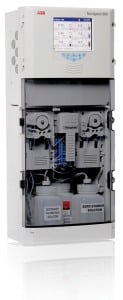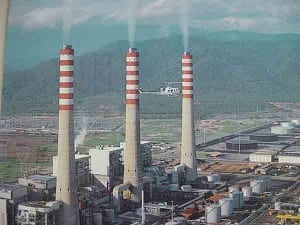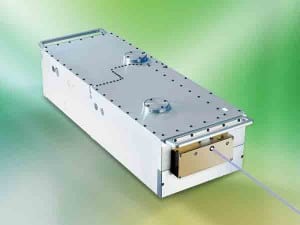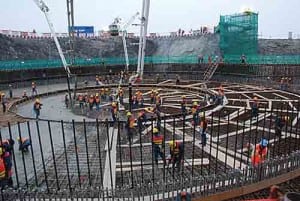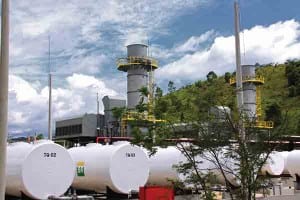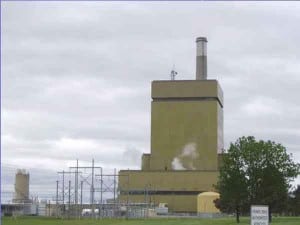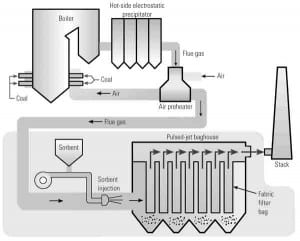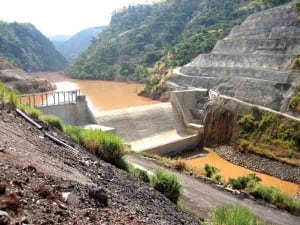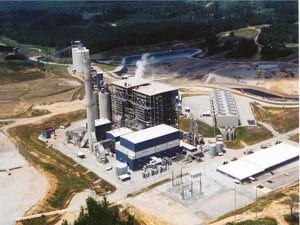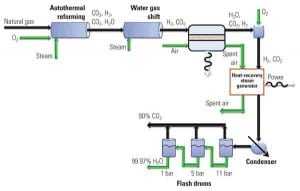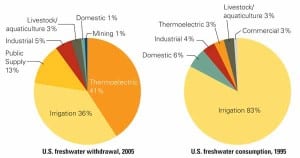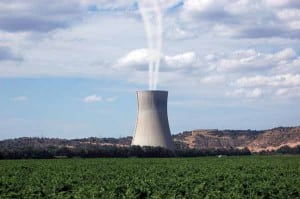In This Issue
-
Commentary
Going Coastal: The Case for Offshore Wind
Offshore wind projects involve regulatory, technological, and economic challenges that are greater than those confronted by onshore wind projects. Overcoming these challenges will be necessary to permit offshore wind to achieve its full potential.
-
News
Mass Flow Meters Conform to EPA Reporting Rule
Sierra Instruments introduced a line of mass flow meters that conform to the new emissions reporting rule from the Environmental Protection Agency. That rule, 40 CFR Part 98, mandates that as of Jan. 2, 2010, U.S. companies that emit more than 25,000 tons a year of carbon dioxide equivalent must report their greenhouse gas (GHG) […]
-
News
Increased Pressure Convertible Water Jet Pump
NLB Corp. has extended the operating pressure range of its convertible NLB 325 Series water jet pump units to 40,000 psi — providing what the company calls the "industry’s widest operating pressure range available with up to 400 hp." These units can be converted in just 30 minutes to operate at 8,000 psi, 10,000 psi, […]
-
News
Laser Welding System with Enclosed Chamber
Huffman Corp. introduced model HP-245ACC, a laser welding system with a fully enclosed atmospheric welding chamber for welding in an inert gas environment. The system is designed for welding oxygen-sensitive or -reactive materials like titanium. The system can be configured with a variety of features like antechambers, inert gas handling and purification systems, oxygen and […]
-
News
Double-Edged Sword
A loosely knit coalition of state leaders and environmental activists petitioned the Securities and Exchange Commission (SEC) in late 2007 for interpretive guidance on the corporate obligation to disclose material information about all aspects of climate change. The petitioners received what they asked for and a little bit more.
-
News
Phosphate Analyzer for High-Pressure Boilers
The new Navigator 600 phosphate analyzer from ABB Instrumentation greatly reduces the amount of reagents and maintenance associated with phosphate monitoring while providing high accuracy and reliability. Designed for phosphate-dosed high-pressure boilers in the power generation industry, the Navigator 600 phosphate analyzer provides accurate monitoring of phosphate concentrations (0 to 15 ppm PO4) in a […]
-
O&M
Venezuela’s Power System on Brink of Collapse
Venezuela, a country that relies on hydropower for almost three-quarters of its electricity, has been battling a deepening electricity crisis since a drought in 2009 and a sudden 7% surge in demand brought the country’s power system to the brink of collapse.
-
News
High-Power 355-nm Industrial Laser
Spectra-Physics, a Newport Corp. brand, introduced an addition to its Pulseo family of Q-Switched diode-pumped solid-state industrial lasers. The rugged and reliable Pulseo 355-10 provides 10 W of 355-nm output at 90 kHz with a short pulse width of less than 23 ns. Key applications for the Pulseo 355-10 are crystalline silicon photovoltaic solar cell […]
-
O&M
Competitive Maintenance Strategies
Many consultants are prospering today by creating "new" maintenance strategies. What they’re really creating is new buzzwords.
-
News
POWER Digest (March 2010)
Masdar, BP Hydrogen Power Plant to Be Completed in 2014. The $2.2 billion Hydrogen Power project — a joint venture between the United Arab Emirates’ renewable energy initiative Masdar (60%) and oil company BP (40%) — should be completed in 2014, the companies said on Jan. 18. The 420-MW plant, located in Abu Dhabi, would […]
-
Legal & Regulatory
Electric Vehicles: The Uncertain Road Ahead
"Diversify, diversify, diversify." That has long been the mantra of many Wall Street pundits when advising investors on how to weather the risks of the stock market. Now advocates of electric vehicles (EVs) are using this same logic to champion plug-in hybrid electric vehicles (PHEVs).
-
Nuclear
China Nuclear Plant Construction Gets Boost—With Technology Transfer
China’s nuclear power plant building spree got a little more frenzied this January, as the country kicked off its 21st project at Ningde 3.
-
Coal
Big Bend’s Multi-Unit SCR Retrofit
Tampa Electric will soon complete a comprehensive selective catalytic reduction project on all four units at its Big Bend Power Station that will make Big Bend among the cleanest coal plants in the U.S. The project — the centerpiece of the company’s 10-year, $1.2 billion air quality improvement program — is on schedule to meet all of its air quality improvement goals by mid-2010.
-
Gas
Brazil Beings Operation of Ethanol Power Plant
Brazil’s state-owned oil producer, Petrobras, on Dec. 31, 2009, said it had inaugurated the world’s first power plant to run exclusively on ethanol.
-
Coal
Big Stone Remodels ESP into Pulse Jet Fabric Filter
Short of replacement, what are your options when your original electrostatic precipitator fails to meet your current emissions and opacity requirements? The management of Big Stone Plant chose the unconventional, yet economic approach of building a pulse jet fabric filter inside the casing of the old electrostatic precipitator. The upgrades restored plant availability and prepare the plant to meet the next regulated reductions in particulate matter emissions.
-
Coal
NETL, We Energies Successfully Complete TOXECON Demonstration
A three-year demonstration of the TOXECON process, a technology to reduce mercury emissions while increasing the collection efficiency of particulate matter (PM), was last year successfully completed at a Michigan coal power plant, the U.S. Department of Energy’s National Energy Technology Laboratory (NETL) reported in January.
-
Hydro
Peru: The Potential to Become a Regional Energy Hub
Water and gas provide the energy for Peru’s power generation sector, and the country could generate considerably more, especially from hydro and wind. While the nation strives to extend electricity service to all its citizens, it’s also looking beyond its borders for potential future customers.
-
Hydro
Ethiopia’s New Hydro Plant Boosts Region’s Generating Capacity
Ethiopia in mid-January officially inaugurated the 420-MW Gilgel Gibe II hydropower project, the second hydropower plant to be opened since November 2009, when the 300-MW Tekezé project began operations.
-
Coal
Real-Time Control of Coal Quality Improves Reliability
Poor lignite fuel quality had plagued the Red Hills Power Plant since it began operation eight years ago. The solution: real-time measurement of coal properties that has allowed Red Hills Mine to carefully monitor fuel quality and adjust fuel collection processes to ensure that only high-quality fuel is delivered to the plant. Now all delivered fuel is consumed, and plant reliability is much improved. It’s a classic win-win project.
-
News
MIT Researchers Propose Solid Oxide Fuel Cells for Natural Gas Power
A new power generation system that uses solid oxide fuel cells in conjunction with natural gas and promises lower carbon emissions would not use any new technology, according to researchers at the Massachusetts Institute of Technology (MIT), but rather would combine existing components in a novel configuration.
-
Water
Strategies to Reduce Sulfuric Acid Usage in Evaporative Cooling Water Systems
Concentrated sulfuric acid is often used to prevent calcium-based scale formation on condenser and heat exchanger tube surfaces in power plant evaporative cooling water systems. Unfortunately, the chemical’s price has jumped more than 300% over the past three years. If the rising cost of water treatment has you under the budget gun, here are some alternative strategies that can reduce or even eliminate your sulfuric acid usage.
-
O&M
Restraining Torsional Vibration
All rotating equipment power trains found in a power plant have some amount of vibration, usually caused by mechanical unbalance of the rotating system, shaft misalignment, or weakness in the bearing support.
-
Coal
Determining Carbon Capture and Sequestration’s Water Demands
The U.S. Department of Energy’s National Energy Technology Laboratory is pursuing a new integrated energy-water R&D program that addresses water management issues relative to coal-fired power generation that takes into account the major impacts of CCS on water use. The goal of this research is to promote more efficient use of water in power plant operations and increase the availability of heretofore unusable waters for power plant use. Those practices can mitigate the impacts of CCS on power plant water use and allow for continued development of energy resources.
-
Water
Harnessing Energy from Upward Heat Convection
The atmospheric vortex engine exploits the natural energy content of the vortex produced during upward heat convection in the atmosphere. The heat source can be solar energy, warm sea water, warm humid air, or even waste heat rejected in a cooling tower. When mature, the technology — currently in the small-scale testing phase — promises to be an efficiency game-changer for fossil-fired power plants.
-
News
Universal Beam Clamps
Harrington Hoists launched its new Universal Beam Clamps, a product line that complements its core product offering of hoists, cranes, and material-handling equipment. The beam clamps are available in metric tons rated 1 through 10; they meet ASME BTH-1 and ASME B30.20, and comply with portions of ASME B30.16; and they have a design factor […]





